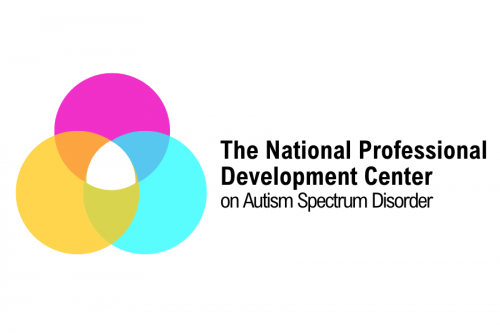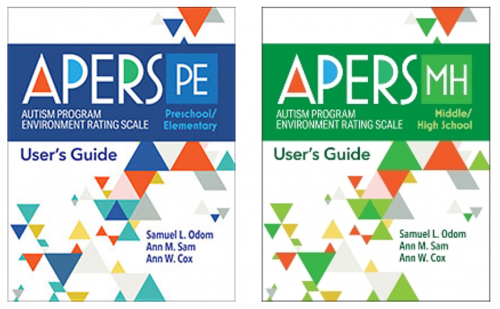
During this virtual training, participants will learn how to use the Autism Program Environment Rating Scale (APERS) in their setting to assess program quality for students with autism. Content will include procedures for administering, scoring, and interpreting the instrument, and for providing feedback to the school program being assessed.

This online training is designed for professionals who support educators in school settings that serve autistic students across school ages in both inclusive and separate settings. The information shared is relevant for related service providers, coaches/technical assistance providers, district/state level support teams, and administrators.
Participants in this training will:
- understand the research, features, and domains of the APERS instrument;
- recognize aspects of program quality for autistic students;
- practice and discuss the APERS self-assessment;
- understand steps for administering APERS including scheduling, observations, record reviews, interviews, and protocols;
- engage in interactive case-scenarios including scoring, review of videos, and preparation for in-person APERS;
- practice in-person APERS in a setting determined by participant;
- discuss in small groups scored APERS; and
- interpret APERS outcomes to generate a report, debrief, and an action plan.
Training will include both didactic instruction, small group discussion, case-scenarios, and independent study. Participants must participate and leave cameras on to obtain CEUs and an APERS Certification.
We encourage participants from the same district/school/team to sign up to complete the APERS training together.
If you have questions, please contact us at: npdc@unc.edu.
Interested in registering 15 participants for an internal training for your district or organization with a preferred date? Please email us at npdc@unc.edu with your request.
Upcoming Event Dates
3-Day Didactic Fall Training (Note: attendees must be available for all three remote, didactic training dates)
- Day 1 and 2: October 16, and October 17, 2025; 10:00 am - 2:00 pm Eastern
- Day 3: November 6, 2025; 10:00 am - 2:00 pm Eastern
- Note: Additional dates will be scheduled with participants for practice (scheduled by participant), scoring, and review
Event Price
$1750
APERS Training Overview
| Time | Format | Content | Description |
| Day 1: 4 hours | Zoom (didactic) | Intro and Overview of APERS | -Introductions -APERS overview (quality, research, features of APERS, domains) -Self-assessment overview |
| Administering APERS Part 1 | -Process overview -Scheduling -Observations -Record reviews | ||
| 1 hour | Homework | APERS Review | -Complete self-assessment -Review APERS protocol -Review interviews |
| Day 2: 4 hours | Zoom (didactic) | Administering APERS Part 2 | -Interviews (practice and videos) -Scoring overview and key terms |
| APERS Case Studies and Preparation for Observations | -Review of videos and practice scoring -Observation, record review and interview overview – preparation for in-person APERS | ||
| 6 hours | Homework | APERS Practice* | -Complete an in-person practice APERS (scheduled by participant) -Score APERS *Note: we recommend you complete with a colleague if a colleague is participating in same APERS training |
| 4 hours – Date TBD with participants | Zoom | Scoring Review | -Meet in small group with trainer to review APERS scores *Note: to be scheduled before Day 3 |
| Day 3: 4 hours | Zoom (didactic) | Debrief and PD Planning | -Report writing -Debriefing with school teams -Professional development planning, development of school plans |
| 1 hour | Homework | APERS Report | -Write an APERS report based on completed APERS |
| 2 hours | Ongoing for 6-month period following training | Technical Assistance | -Trainer reviews completed report -Meet individually with trainer for questions and support as needed |
Training Instructors

Ann Sam is a senior research scientist at Frank Porter Graham Child Development Institute and an author of APERS. Her research and professional development interests are rooted in her direct experience as a public-school teacher working in preschool and kindergarten classrooms with students with autism. The primary goal of her work is to increase awareness and use of evidence-based interventions and resources designed to improve outcomes for students with autism. At the heart of her work is ensuring this access extends to professionals in under-served communities—those with fewer resources available for extensive in-person training and support. To address this goal, Sam's research and professional development activities focus on two primary areas: 1) using novel technologies to provide interventions to students and professional development to educators; and 2) rigorously researching professional development materials and models for educators to determine effective ways to increase successful implementation of evidence-based practices with students with autism.

Becky Dees is an Educational Consultant with the autism group at the Frank Porter Graham Child Development Institute. She spends time in classrooms, coaching teachers on their use of evidence-based practices. She has written modules for the Autism Focused Intervention Resources and Modules (AFIRM) and AFIRM for Toddlers. She provides training for the National Professional Development Center on Autism (NPDC) and on APERS. She also works with the TEACCH Autism Program providing training for educators and clinicians working with individuals with autism. Dees has more than 20 years of experience working with autistic individuals of all ages and providing training and coaching for professionals.
